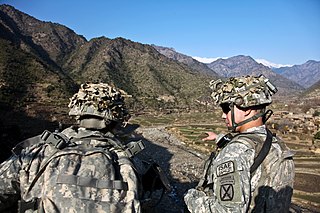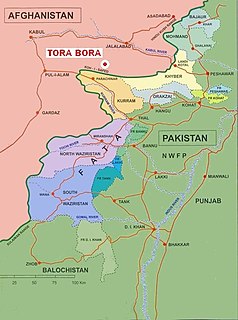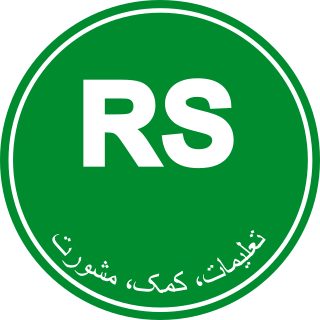
Operation Enduring Freedom (OEF) was the official name used by the U.S. government for the Global War on Terrorism. On 7 October 2001, in response to the September 11 attacks, President George W. Bush announced that airstrikes targeting Al-Qaeda and the Taliban had begun in Afghanistan. Operation Enduring Freedom primarily refers to the War in Afghanistan, but it was also affiliated with counterterrorism operations in other countries, such as OEF-Philippines and OEF-Trans Sahara.

The Special Air Service (SAS) is a special forces unit of the British Army. The SAS was founded in 1941 as a regiment, and later reconstituted as a corps in 1950. The unit specialises in a number of roles including counter-terrorism, hostage rescue, direct action and covert reconnaissance. Much of the information about the SAS is highly classified, and the unit is not commented on by either the British government or the Ministry of Defence due to the secrecy and sensitivity of its operations.

The International Security Assistance Force (ISAF) was a multinational military mission in Afghanistan from 2001 to 2014. It was established by United Nations Security Council Resolution 1386 pursuant to the Bonn Agreement, which outlined the establishment of a permanent Afghan government following the U.S. invasion in October 2001. ISAF's primary goal was to train the Afghan National Security Forces (ANSF) and assist Afghanistan in rebuilding key government institutions; however, it gradually took part in the broader war in Afghanistan against the Taliban insurgency.

The Special Air Service Regiment, officially abbreviated SASR though commonly known as the SAS, is a special forces unit of the Australian Army. Formed in 1957, it was modelled on the British SAS sharing the motto, "Who Dares Wins". The regiment is based at Campbell Barracks, in Swanbourne, a suburb of Perth, Western Australia, and is a direct command unit of the Special Operations Command. It has taken part in operations in Borneo, Vietnam, Somalia, East Timor, Iraq and Afghanistan, as well as many other peacekeeping missions. The SASR also provides a counter-terrorist capability, and has been involved in a number of domestic security operations.

Bagram Airfield-BAF also known as Bagram Air Base is an Afghan military base, and formerly the largest U.S. military base in Afghanistan. It is located next to the ancient city of Bagram, 11 kilometres (6.8 mi) southeast of Charikar in the Parwan Province of Afghanistan. It has a single runway capable of handling large military aircraft, including the Lockheed Martin C-5 Galaxy and Antonov An-225. It was staffed by the 455th Air Expeditionary Wing of the U.S. Air Force, along with rotating units of the US and coalition forces.

The Afghan National Army was the land warfare branch of the Afghan Armed Forces. The Army's roots could be traced back to the early 18th century when the Hotak dynasty was established in Kandahar followed by Ahmad Shah Durrani's rise to power. It was reorganized in 1880 during Emir Abdur Rahman Khan's reign. Afghanistan remained neutral during the First and Second World Wars. From the 1960s to the early 1990s, the Afghan Army was equipped by the Soviet Union.

The Australian contribution to the war in Afghanistan has been known as Operation Slipper (2001–2014) and Operation Highroad (2015-2021).

Sar-e Pol, also spelled Sari Pul, is one of the thirty-four provinces of Afghanistan, located in the north of the country. It borders Jowzjan and Balkh to the west and north, Ghor to the south, and Samangan to the east. The province is divided into 7 districts and contains 896 villages. It has a population of about 632,000, which is multi-ethnic and mostly a tribal society. The province was created in 1988, with the support of northern Afghan politician Sayed Nasim Mihanparast. The city of Sar-e Pol serves as the provincial capital.

The Light Dragoons (LD) is a cavalry regiment in the British Army. The regiment has a light cavalry role and specialises in mounted and dismounted reconnaissance. The Light Dragoons recruit mainly in Northern England, from the counties of Northumberland, Tyne and Wear, County Durham, South Yorkshire and the East Riding of Yorkshire. For this reason, the regiment is known as "England’s Northern Cavalry". It is currently based in Catterick Garrison North Yorkshire.

In late 2001, the United States, supported by its close allies, invaded Afghanistan and toppled the Taliban government. The invasion's public aims were to dismantle al-Qaeda, which had executed the September 11 attacks, and to deny it a safe base of operations in Afghanistan by removing the Taliban government from power. The United Kingdom was a key ally of the United States, offering support for military action from the start of preparations for the invasion. It followed the Afghan Civil War's 1996–2001 phase between the Taliban and the Northern Alliance groups, which resulted in the Taliban controlling 90% of the country by 2001. The invasion became the first phase of a 20-year long war in the country, and marked the beginning of the U.S. War on Terror.

The Battle of Tora Bora was a military engagement that took place in the cave complex of Tora Bora, eastern Afghanistan, from December 6–17, 2001, during the opening stages of the United States invasion of Afghanistan. It was launched by the United States and its allies with the objective to capture or kill Osama bin Laden, the founder and leader of the militant organization al-Qaeda. Al-Qaeda and bin Laden were suspected of being responsible for the September 11 attacks three months prior. Tora Bora is located in the White Mountains near the Khyber Pass. The U.S. stated that al-Qaeda had its headquarters there and that it was Bin Laden's location at the time.

Operation Herrick was the codename under which all British operations in the War in Afghanistan were conducted from 2002 to the end of combat operations in 2014. It consisted of the British contribution to the NATO-led International Security Assistance Force (ISAF), and support to the American-led Operation Enduring Freedom (OEF), within the central Asian country.

Following the terrorist attacks of September 11, 2001, several nations took on Al-Qaeda and the Taliban during Operation Enduring Freedom (OEF) in Afghanistan. OEF was the initial combat operations starting on 7 October 2001, in the wake of the 11 September attacks on the United States, and during 2002 and 2003.

Operation Jacana is the codename for a series of operations carried out by coalition forces in Afghanistan. The operations were carried out most notably by 45 Commando Royal Marines. U.S. forces, Australian SAS and Norwegian FSK also participated. The operation was a follow-up operation of Operation Anaconda and was meant to kill or capture the remaining Al-Qaida and Taliban rebels. The operation has been called a "mopping up" operation after Operation Anaconda. The operation is named after an African bird type, jacana, described in one manual as "shy, retiring, easily overlooked".

The War on Terror (WoT), also known as the Global War on Terrorism (GWOT) and the U.S. War on Terror, is the term that refers to an ongoing international military campaign launched by the United States government following the September 11 attacks. The targets of the campaign are primarily extremist groups located throughout the Muslim world, with the most prominent groups being Al-Qaeda, the Islamic State and their various franchise groups. The naming of the campaign uses a metaphor of war to refer to a variety of actions that do not constitute a specific war as traditionally defined. U.S. president George W. Bush first used the term "war on terrorism" on 16 September 2001, and then "war on terror" a few days later in a formal speech to Congress. In the latter speech, President Bush stated, "Our enemy is a radical network of terrorists and every government that supports them." The term was originally used with a particular focus on countries associated with al-Qaeda. The term was immediately criticized by such people as Richard B. Myers, chairman of the Joint Chiefs of Staff, and more nuanced terms subsequently came to be used by the Bush administration to publicly define the international campaign led by the U.S. While it was never used as a formal designation of U.S. operations in internal government documentation, a Global War on Terrorism Service Medal was issued.

The War in Afghanistan was a conflict that took place from 2001 to 2021 in Afghanistan. It began when the United States and its allies invaded Afghanistan and toppled the Taliban-ruled Islamic Emirate. The war ended with the Taliban regaining power after a 19 years and 10 months-long insurgency against allied NATO and Afghan Armed Forces. It was the longest war in United States history, surpassing the Vietnam War (1955–1975) by approximately five months.

Operation Toral was the codename for the British presence within Afghanistan post-2014 as part of NATO's Resolute Support Mission. UK forces had two major tasks: training and mentoring Afghan Forces, and providing force protection for NATO advisors via the Kabul Security Force/Kabul Protection Unit.

Resolute Support Mission (RSM) or Operation Resolute Support was a NATO-led multinational mission in Afghanistan. It began on 1 January 2015 as the successor to the International Security Assistance Force (ISAF), which was completed on 28 December 2014. Pursuant to United Nations Security Council Resolution 2189 of 2014, RSM was a noncombat mission aimed at advising and training Afghan security forces to provide long-term security to the country, under the aegis of the Security and Defence Cooperation Agreement BSA between the United States and Afghanistan, which was originally supposed to run from 1 January 2015 and "shall remain in force until the end of 2024 and beyond" unless terminated with two years' advance notice.

Operation Pitting was a British military operation to evacuate British nationals and eligible Afghans from Afghanistan following the 2021 Taliban offensive. The operation consisted of more than 1,000 military personnel, including soldiers from 16 Air Assault Brigade. It ran concurrently with the evacuation efforts of numerous other countries.


















